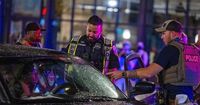On Monday, September 15, 2025, President Donald Trump reignited a fierce battle over who controls policing in the nation’s capital, threatening to declare a new national emergency and federalize Washington, D.C.’s police force. The move came just days after D.C. Mayor Muriel Bowser announced that the Metropolitan Police Department (MPD) would no longer cooperate with Immigration and Customs Enforcement (ICE) on immigration enforcement, following the expiration of Trump’s 30-day emergency authority over the city’s police.
In a late-night post on his Truth Social platform, Trump lashed out at Bowser, asserting, “It has been a beautiful thing to watch but, now, under pressure from the Radical Left Democrats, Mayor Muriel Bowser, who has presided over this violent criminal takeover of our Capital for years, has informed the Federal Government that the Metropolitan Police Department will no longer cooperate with ICE in removing and relocating dangerous illegal aliens.” He warned, “If I allowed this to happen, CRIME would come roaring back. To the people and businesses of Washington, D.C., DON’T WORRY, I AM WITH YOU, AND WON’T ALLOW THIS TO HAPPEN. I’ll call a National Emergency, and Federalize, if necessary!!!” (NBC News, The Hill, theGrio).
The roots of this standoff stretch back to August 11, 2025, when Trump invoked Section 740 of the D.C. Home Rule Act, taking unprecedented federal control of the MPD for 30 days. The White House framed the move as a crackdown on crime and homelessness, sending about 2,000 National Guard troops—including 150 military police from Ohio and reinforcements from Republican-led states—into the city. While the federal emergency expired on September 10, the Army extended authorization for National Guard troops through November 30 (NBC News, theGrio, The Hill).
Trump has repeatedly claimed his intervention turned D.C. from “one of the most dangerous and murder ridden cities in the U.S.A., and even around the World, to one of the safest – In just a few weeks.” He boasted, “The ‘place’ is absolutely booming, with restaurants, stores, and businesses packed and, for the first time in decades, virtually NO CRIME” (Truth Social, NBC News, theGrio). But these claims are sharply disputed by local officials and crime data. According to statistics from the Metropolitan Police Department, violent crime in D.C. fell 35% in 2024 and has continued to decline into 2025, contradicting Trump’s dire warnings about a potential crime surge (NBC News, Axios).
Mayor Bowser has walked a careful line throughout the federal emergency. While she credited the increased law enforcement presence with reducing certain types of crime, she also criticized the tactics of masked ICE agents and the National Guard, saying, “We know having masked ICE agents in the community has not worked and National Guard from other states has not been an efficient use of those resources.” She added, “Immigration enforcement is not what MPD does. And with the end of the emergency, it won’t be what MPD does in the future” (The Hill, NBC News, theGrio).
Bowser’s executive order, issued in early September as the federal emergency expired, mandated indefinite coordination between the city and most federal law enforcement agencies—but pointedly excluded ICE. This decision, she explained, was a return to the “preemergency status quo,” emphasizing that the MPD would not participate in immigration enforcement going forward (The Hill, NBC News, theGrio).
The president’s threats have reignited local outrage and national debate about the limits of federal power in American cities, especially those with large Black and brown populations and Democratic leadership. Protesters took to the streets on August 30, with the “DC AGAINST TRUMP COALITION” calling for an end to federal law enforcement and National Guard presence in the capital (Axios).
Jamal Holtz, president of D.C. Young Democrats, spoke bluntly to theGrio: “Over and over again, Trump keeps pushing this false narrative that he’s making D.C. safer. He’s wrong. D.C. is not the dangerous place he describes, and his federal overreach—deploying the Guard and ICE into our neighborhoods—has actually hurt us. Restaurants are suffering, reservations are down, and people don’t want to dine out in a city that feels like a militarized zone. His actions are killing our city and our economy blindly.” Holtz added, “As a community, we should all be deeply concerned about what that means for our democracy and needing members of Congress to stand up and protect it at all costs. The residents of D.C., our mayor, and council get to dictate what safety looks like in D.C., not Trump.”
Markus Batchelor, a D.C. native and political director at People For the American Way, argued to theGrio that Trump’s actions were “never about public safety, but about advancing Trump’s promised incarceration and deportation campaign on Black and brown Americans. D.C. is just a pilot program for a national effort.” He continued, “This should make clear to D.C. leaders that there’s no use in trying to pacify a fascist who can’t be satisfied. He will use whatever lever he has to finish the job. No more concessions when real lives hang in the balance. It’s time to stand firm and fight back.”
Bowser herself has expressed distress at the climate of fear stoked by federal immigration enforcement. “I am devastated by people living in fear,” she said, reiterating her concern that the presence of federal agents and troops, rather than making residents feel safer, had eroded trust and traumatized communities (theGrio, NBC News).
Meanwhile, the legal and political wrangling continues. On August 15, D.C. filed a federal lawsuit challenging Trump’s emergency order, arguing that the administration exceeded its legal authority and violated the city’s constitutional right to self-governance (NBC News, The Hill). Congress declined to extend Trump’s 30-day emergency authority, with Speaker Mike Johnson (R-La.) stating it was “not necessary,” as the city had been cooperative (The Hill). Yet, the Army’s extension of National Guard deployment signals ongoing federal involvement in city affairs.
Trump’s threats to federalize local police are not limited to D.C. Last week, he announced plans to send the National Guard into Memphis, Tennessee, and has threatened similar interventions in Chicago, New Orleans, Baltimore, and Los Angeles. In Los Angeles, a federal judge ruled that Trump’s earlier deployment of 4,000 National Guard troops and 700 Marines violated a 19th-century law banning the use of soldiers for civilian law enforcement (NBC News).
Critics warn that the president’s willingness to assert federal control over local law enforcement represents a troubling expansion of executive power, especially in cities that have historically struggled for self-determination. Supporters, however, argue that federal action is necessary to combat crime and restore order. The debate has grown increasingly partisan, with Democrats accusing Trump of political theater and Republicans defending his efforts to “restore safety and beauty” to the capital (NBC News, The Hill).
As the standoff over ICE cooperation and federal control continues, the question of who gets to define public safety in Washington, D.C.—and in America’s cities at large—remains as contentious and unresolved as ever.


